The Founder Series is a column by and about Utah founders and how they got to where they are today. Click here to read past articles in the series.In April 2020, I found myself sitting with my wife in my young son’s upstairs bedroom, hiding from the chaos of my nine children and home school, on one of the most important business phone calls of my life.
It was surreal to sit on the phone, staring up at blankets rigged to the ceiling as a makeshift fort, clothes on the floor around me, while the lawyer asked each participant on the call to give verbal consent for a multi-million dollar acquisition contract to be signed. When everyone had answered in the affirmative, we hung up.
Just like that, the business we had built from the ground up became something that I could have only imagined 11 years earlier. We had “leveled-up” and were a vastly different company, poised to tackle the entire corporate learning industry.
Founding eLearning Brothers
Before there was ELB Learning, there was eLearning Brothers––an eLearning template business born from tragedy in a basement with my brother. Recently widowed, he was looking for a way to support his family from home, and I had been looking for the right business idea my entire life.
My brother and I were both in the corporate learning field, and we knew we could help other professionals become eLearning rockstars with the right tools. It was such a simple idea. We would sell multimedia assets and templates for all types of eLearning applications. The reality, though, was anything but simple. We were creating an industry that didn’t exist yet. At the time, there was just the two of us, two laptops, and that was it.
In the beginning, I kept my full-time job, working on ELB Learning (formerly eLearning Brothers) as a side gig. But soon, all I could think about was the business. It was so thrilling to wake up in the morning and see sales that had come in. I couldn’t wait until my lunch break so I could make calls about ELB, and I couldn’t wait until after work to talk to my brother about new ideas and plans.
Mine is not the story of someone leaving a crappy job with an overbearing boss and a horrible commute. I loved my job, and I was good at it. So committing fully to a fledgling business while I had, at the time, six children to support was incredibly risky and I was afraid of failing my family. But there came this moment when I realized that if I didn’t do this, I would always wonder, “what if?” That realization changed my life forever. I quit my job soon after and went all in on building something of my own. to make this work.

Experiencing the highs and lows
Fortunately, it did work.
Over the next few years, the business grew significantly and changed a little. We won partnerships with big names like Adobe and Microsoft that took us to the next level. We conquered the eLearning template market and figured out how to manage thousands of files, created subscriptions for our clients, and brought on board a team to lead custom services.
We experimented with how to run the business and went through a few different ownership models, but in 2018, I became the official CEO of the company. For the first time, I could lead the company exactly how I wanted to, with my personality and my vision.
By 2018, the eLearning template business was changing. Most of the big brands had adopted our model and were building their own assets in-house, and those that weren’t were already our clients. The market was saturated, and there really wasn’t anywhere to go with it. We went from celebrating INC 5000 listings every year to a period of slower growth that felt like defeat.
It was at this point that I sat down and gave myself a pep talk, another moment that had the potential to change everything. I knew that we were at a point where, if we continued down the road in the same direction, we were on track to land softly, sell to a larger brand, and be done. That would be the end of the story.
But still, after all these years, I could not stop thinking about the business. For a few years, a seed had been growing in my thoughts. We were making templates for all of these eLearning tools––why didn’t we own any of those tools? The industry was evolving, and there was space for someone to step up and become the full eLearning ecosystem, more than the sum of its parts. Why couldn’t that be our brand? Instead of being acquired, we could acquire other tools and build that community in the exact way that I envisioned it. And frankly, this sounded a lot more fun.
Once again, I knew that if I didn’t do this, I would always wonder, “what if?”I went to my leadership team and pitched the idea to them. I had worked with most of these people for many years, and we trusted each other. I gave everyone an out––I told them we were taking things in a new direction, becoming a technology and content business. If they liked that idea, great. However, if they were not 100 percent committed to my vision, no hard feelings, but they needed to move on to something else. I knew I needed everyone fully behind me if I was going to pull it off. I feel so privileged that every single one of my team members stayed with me.
Closing a deal mid-Covid
I spent the next year reaching out to private equity firms, courting technology platforms, and putting together an incredibly complex deal. It was exhilarating and emotional, and challenging in all of the right ways. After a lot of ups and downs and negotiations, I finally had everything in place.
That deal was supposed to close in March of 2020.
You can imagine what happened next because it was a collective jolt that harmed a lot of people and caused the business world to evolve overnight. As the world shuttered its doors in the wake of the coming pandemic, the dream I had been inches away from seemed to crumble right in front of me.
On Friday the 13th of all days, we closed our office indefinitely. The following Wednesday, my nine children started homeschool, and an earthquake hit Salt Lake City—it felt as if the literal forces of nature were against me.
As the weeks stretched on and it became clear that this would not be a short-lived change, investors pulled out of the deal, and everything went sideways. It seemed my vision was not meant to be after all.
And then, the phone calls started coming in. As every business in the world was forced to consider new solutions that would help bring together their workers virtually, eLearning became instantly essential. The pandemic meant that the eLearning industry consolidated five years of growth into roughly five weeks. March 2020 was a record custom course sales month.
I went back to my investors, armed with this data, my enthusiasm, and a total commitment to the vision I knew would work. The investors were scared, our clients were scared, and other eLearning companies were scared. There was a lot of fear to go around in those days, but they were convinced to push forward with me.
Ours was one of the only private equity deals to close that month. As I sat in my son’s bedroom when the official call ended, the enormity of what had just happened hit me. That moment didn’t have the confetti and grandiose that I thought it would, we couldn’t go out and celebrate, but it was perhaps more special because of the struggle that it took to get there.
Evolving to ELB Learning
We’re not done. In the last two years, we’ve acquired six companies, with more acquisitions on the way. We now have more than 500 employees across the globe. As remote work takes hold and leaders see that we have the tools to help drive that, we continue to grow organically as well.
From a company that initially sold just templates and assets, we now offer a huge range of products and services, including gamification, VR, authoring tools, learning platforms, video-based practice, custom courses, and staff augmentation.
Every executive I’ve approached about selling their company to us is someone I have built a relationship with, and I have earned their trust. There are risks to what we are doing, sure, but I believe in the future that we are building. I led by example, selling my company for private equity, and then I shared my dream with other industry leaders, most of whom stayed on after we merged.
We are a group of passionate people who know what the world of digital learning can really be, and we’re driving our company toward that ideal. As the business evolved into something new, it was absolutely time for our name and image to reflect our journey. So, with everything else going on, we rebranded into ELB Learning. The basement my brother and I shared back in 2009 may be the company’s birthplace, but that moment in 2020, when everything came together, and we recommitted to a bigger, bolder mission, is our new birthdate. We are looking forward, not back.
Being an entrepreneur has taught me a lot about myself. I’m very comfortable with who I am and who I’m not. I will never portray myself as something different. I’ve passed the point of needing outside validation for my personal or professional choices. That has come back to me in amazing ways because when you’re authentic with someone, and they believe you, they keep believing you. When you need to have harder conversations, they already have that belief and trust to fall back on. That’s how we work and how we will continue to bring more tools, ideas, talent, and strong personalities under our brand.
If I had a single piece of advice for an entrepreneur who is standing where I was 11 years ago, it would be this: commit. If you have landed on that perfect idea if you have someone supportive at your side, what are you waiting for? At every decision point in my business, the difference was made when I was all in. Once you fully dedicate yourself to your vision, so many obstacles will get out of your way.

